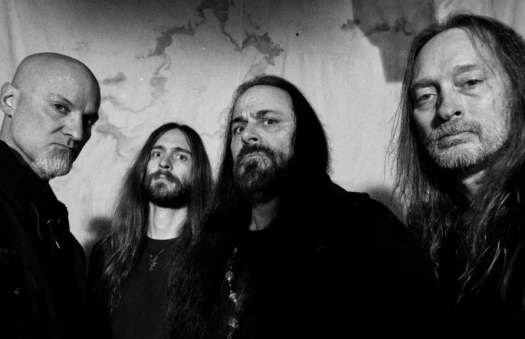As members of the extended Godspeed You! Black Emperor/A Silver Mt. Zion universe continue to expand and deepen their individual voices, it remains a curiosity to hear what they've carried with them from their work with the group and how their contributions evolve in new contexts. In the case of Jessica Moss, violinist in A Silver Mt. Zion, this distance clearly gives her a chance to step away from the emotional churn of that group into a more distinctly intellectual space.
Coming less than a year after her last release Phosphenes, Galaxy Heart is billed as a companion piece, with material for both of the albums conceived during the extended pandemic isolation. Where that last album concentrated more on precise composition and detailed performance, Galaxy Heart presents more of a forcefully blurred exploration of texture and tone. Moss's instruments are pushed into the red at times, letting an overdriven electrical sound dominate the mix.
The album's various musical themes come in pairs or triplets, the most compelling involving contributions from Moss's ASMZ bandmate Thierry Amar on upright bass and Dirty Three's Jim White on drums. Both "Uncanny Being (Violin Study #2)" and "Is There Room for All of It" have a kind of dynamic chaos, with White's trademark scattershot drumming creating an unpredictable canvas for Moss and Amar to add pointillist detail or draw broadly over with longer lines.
On "This Continuous Spectrum" and the title track, Moss tries on the electric guitar, further flexing the distorted tones and drones she'd introduced with her violin at the album's outset. The search to find the beautiful or transcendent within the murk and graininess of sound puts Moss in line with a tradition that includes minimal/maximal artists like Tony Conrad and Henry Flynt through occasional labelmate Colin Stetson and metal druids Sunn O))). Other elements, like the inclusion of vocals by Moss, add an element of longing, suggesting disconnected souls in the vastness of space, punctuated at times by a haphazard drum machine pulse.
Given the patchwork nature of the album's recording, Radwan Moumneh's post-production manages to assemble a resonant collection. His own voice appears in the occasional highlighting of Eastern modes and tones that had been more prevalent in Moss's earlier group collaborations. One small technical gripe is his handling of Jim White's drums, which at times all but disappear in the mix, perhaps an unavoidable side effect of their contribution from far off Melbourne.
It's an album that has its sights set on discovering cosmic truths, and it succeeds moment to moment and within individual pieces, but doesn't cohere into a satisfying flow — more a collection of disparate ideas reshaped after the fact of conception. Taken as a kind of sampler assembled from the various moments of solitude over these last few years, there are very promising paths to follow out into the slowly reconnecting universe.
(Constellation)Coming less than a year after her last release Phosphenes, Galaxy Heart is billed as a companion piece, with material for both of the albums conceived during the extended pandemic isolation. Where that last album concentrated more on precise composition and detailed performance, Galaxy Heart presents more of a forcefully blurred exploration of texture and tone. Moss's instruments are pushed into the red at times, letting an overdriven electrical sound dominate the mix.
The album's various musical themes come in pairs or triplets, the most compelling involving contributions from Moss's ASMZ bandmate Thierry Amar on upright bass and Dirty Three's Jim White on drums. Both "Uncanny Being (Violin Study #2)" and "Is There Room for All of It" have a kind of dynamic chaos, with White's trademark scattershot drumming creating an unpredictable canvas for Moss and Amar to add pointillist detail or draw broadly over with longer lines.
On "This Continuous Spectrum" and the title track, Moss tries on the electric guitar, further flexing the distorted tones and drones she'd introduced with her violin at the album's outset. The search to find the beautiful or transcendent within the murk and graininess of sound puts Moss in line with a tradition that includes minimal/maximal artists like Tony Conrad and Henry Flynt through occasional labelmate Colin Stetson and metal druids Sunn O))). Other elements, like the inclusion of vocals by Moss, add an element of longing, suggesting disconnected souls in the vastness of space, punctuated at times by a haphazard drum machine pulse.
Given the patchwork nature of the album's recording, Radwan Moumneh's post-production manages to assemble a resonant collection. His own voice appears in the occasional highlighting of Eastern modes and tones that had been more prevalent in Moss's earlier group collaborations. One small technical gripe is his handling of Jim White's drums, which at times all but disappear in the mix, perhaps an unavoidable side effect of their contribution from far off Melbourne.
It's an album that has its sights set on discovering cosmic truths, and it succeeds moment to moment and within individual pieces, but doesn't cohere into a satisfying flow — more a collection of disparate ideas reshaped after the fact of conception. Taken as a kind of sampler assembled from the various moments of solitude over these last few years, there are very promising paths to follow out into the slowly reconnecting universe.




